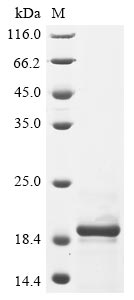Recombinant Human coronavirus HKU1 Non-structural protein 4 is produced in E.coli and includes a full-length amino acid sequence from position 1 to 109. This protein features an N-terminal 6xHis tag for easy purification and detection. It has a purity exceeding 85%, as verified by SDS-PAGE analysis. This product is designed for research use only and is not intended for diagnostic or therapeutic applications.
Non-structural protein 4 (nsp4) of Human coronavirus HKU1 appears to play a crucial role in the virus's replication and assembly processes. It seems to be involved in forming the replication organelle, which is essential for viral genome replication. Research into nsp4 may provide valuable insights into coronavirus biology and potentially help in developing strategies to combat viral infections.
Potential Applications
Note: The applications listed below are based on what we know about this protein's biological functions, published research, and experience from experts in the field. However, we haven't fully tested all of these applications ourselves yet. We'd recommend running some preliminary tests first to make sure they work for your specific research goals.
The protein is expressed in E. coli as a full-length non-structural protein 4 (NSP4) of HCoV-HKU1 (1–109 aa) with an N-terminal 6xHis tag. While full-length expression preserves the complete primary sequence, E. coli often struggles to correctly fold coronavirus non-structural proteins—many of which rely on precise disulfide bonds, transmembrane domains, or interaction interfaces for function. No data confirms native secondary/tertiary structure (e.g., circular dichroism, thermal shift assays) or stability. E. coli may produce misfolded NSP4, which fails to adopt the conformation required for biological activity. NSP4 is critical for viral replication (e.g., forming the replication-transcription complex with other NSPs). Its bioactivity (e.g., binding to NSP12/NSP7 or host factors) is untested—E. coli-expressed protein may lack functional interfaces, limiting its ability to mimic native NSP4.
1. Viral Protein Interaction Studies
This recombinant NSP4 can be used in pull-down/co-IP assays to map interactions, but results depend entirely on correct folding—E. coli-expressed NSP4 may misfold, causing false positives/negatives. Identified partners must be validated via functional assays (e.g., replicon assays) to rule out artifacts. The full length supports interaction studies, but bioactivity (e.g., binding to other NSPs) is unconfirmed.
2. Antibody Development and Characterization
This protein can serve as an immunogen, but antibody specificity must be validated against native NSP4—E. coli-expressed protein may present non-native epitopes, leading to antibodies that fail to recognize native NSP4 in viral particles or infected cells. The His tag simplifies ELISA screening, but antibody utility for detecting infection or localizing NSP4 requires validation with native samples.
3. Structural and Biochemical Characterization
This NSP4 supports preliminary biophysical studies (e.g., CD for secondary structure, DLS for stability) but cannot inform native NSP4 architecture—E. coli-expressed protein may lack correct disulfide bonds or oligomerization states. Structural conclusions (e.g., monomeric vs. multimeric) must be contextualized by folding limitations.
4. Comparative Coronavirus Research
This protein enables cross-reactivity studies with other coronavirus NSP4 orthologs, but PTMs and folding differences may confound results—E. coli-expressed HCoV-HKU1 NSP4 may not align structurally with NSP4 from SARS-CoV/MERS-CoV. Evolutionary insights require complementary data (e.g., sequence alignment, functional assays) to account for system-specific artifacts.
Final Recommendation & Action Plan
This E. coli-expressed HCoV-HKU1 NSP4 has potential for interaction mapping or antibody development but requires urgent validation first, confirm folding via circular dichroism/thermal shift assays; second, validate bioactivity (e.g., binding to NSP12) using co-IP or replicon assays. Optimize expression (e.g., co-express molecular chaperones like GroEL/ES, lower induction temperature) to improve solubility/native folding. For comparative research, use orthogonal methods (e.g., NMR for structural alignment) to mitigate system biases. If folding/bioactivity fails, switch to a eukaryotic system (e.g., insect cells) or in vitro refolding to ensure native structure—this NSP4’s role in replication demands functional validation before downstream use.






